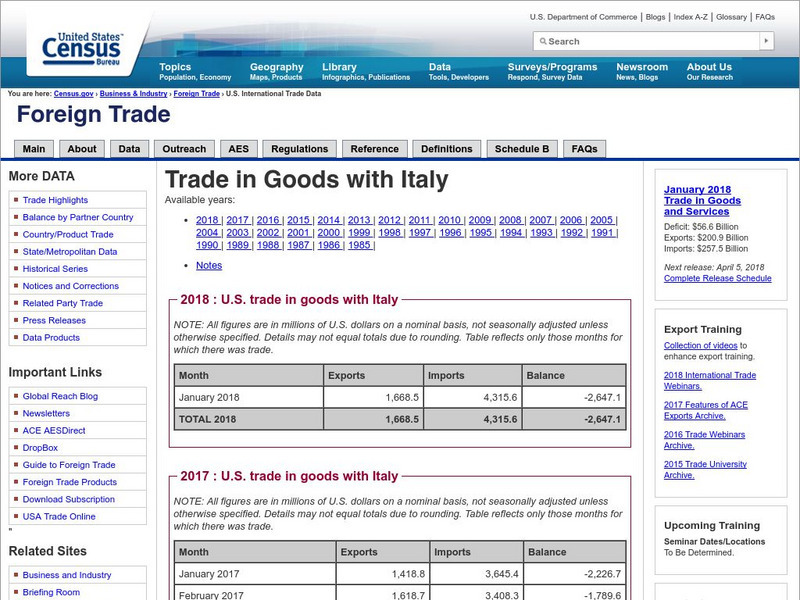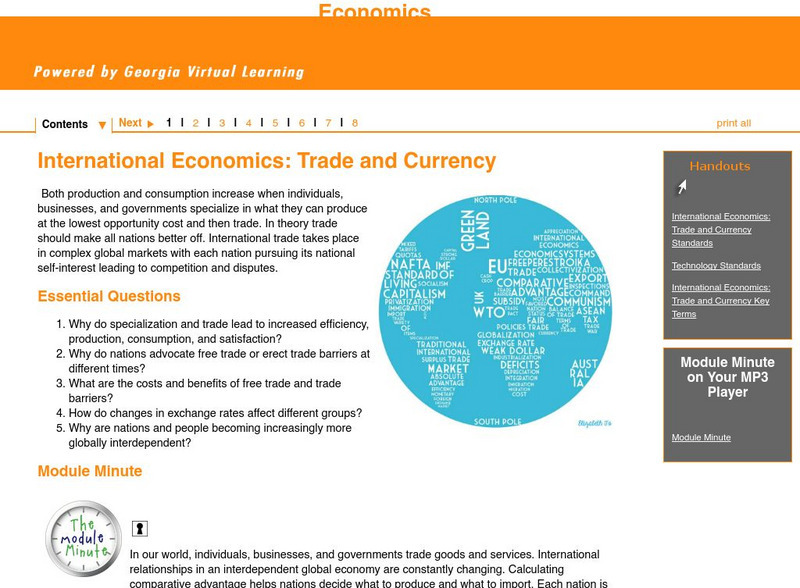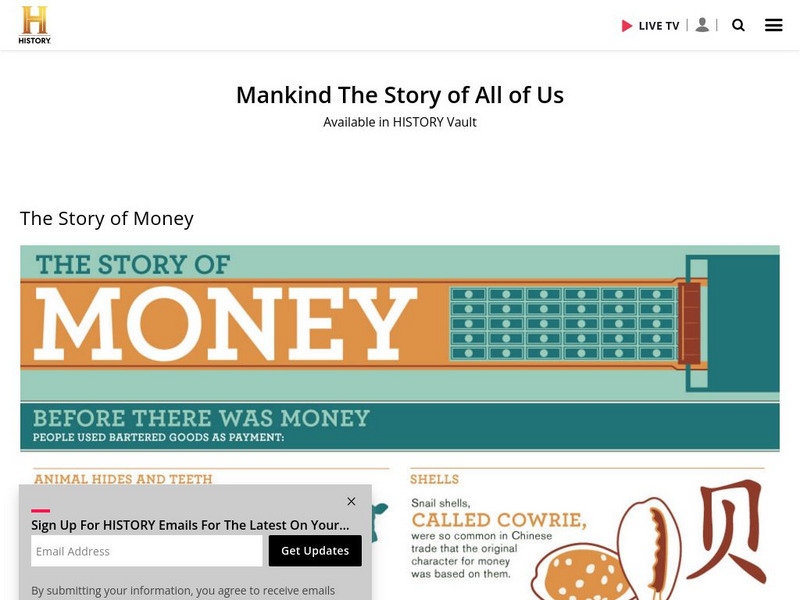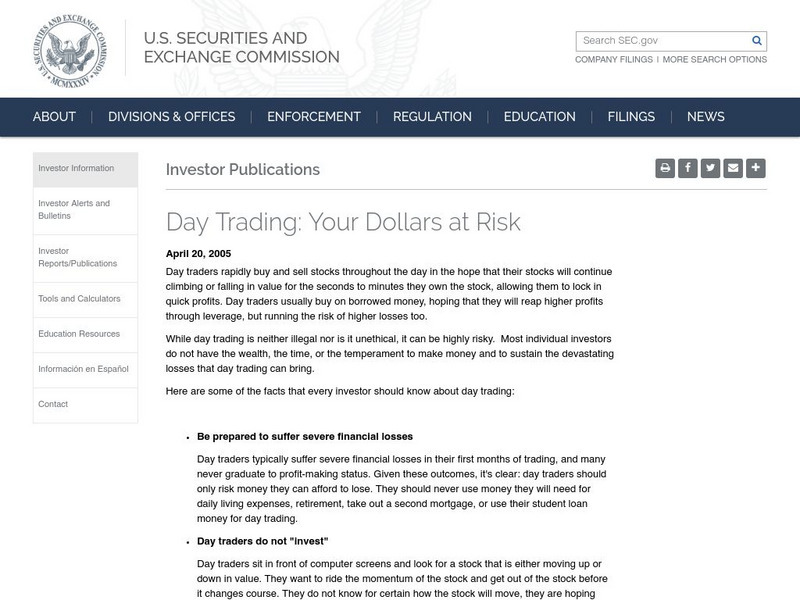Hi, what do you want to do?
Better Lesson
Better Lesson: Want to Trade?
Students will write about what they would trade for gold and practice inventive spelling in the process. After reading "In 1492", students will discuss how Christopher Columbus traded with the natives and then write what they would trade...
Other
International Monetary Fund: All About Money [Pdf]
A valuable resource for educators who are teaching their students about money. A series of lesson plans cover everything from the different forms of currency over time, to trade and economic growth and exchange. Activities and games are...
Colonial Williamsburg Foundation
Colonial Williamsburg: Numismatics: Coins and Currency in Colonial America
Valuable lessons in the history of Europeans' early exploration and settlement of America can be gained by following the money used in trade. Coins and Currency exhibition lets you examine evidence of Spanish, British, Dutch, French, and...
US Census Bureau
Uscb: u.s. Trade Balance With Italy
Charts make it easy to read the yearly trade (both imports and exports) in U.S. dollars wtih Italy.
University of Notre Dame
Department of Special Collections: The Coins of Colonial and Early America
This site provides links to a variety of coins used in the colonies and in the confederation. Extremely detailed.
Georgia Department of Education
Ga Virtual Learning: Economics: International Economics: Trade and Currency
Economics learning module on international trade and currency. Unit includes multi-media resources, assignments, projects and tests.
Federal Trade Commission
Federal Trade Commission: Consumer: Making a Budget
Learn all about budgeting including saving money and how to make and use a budget. Includes examples.
University of Notre Dame
Coin and Currency Collections: Wampum
The University of Notre Dame in Indiana has a special collections section on coins and currencies, this web page is part of the website representing these artifacts and the history related to them. Wampum, the currency of fur trading, is...
Texas Education Agency
Texas Gateway: Chapter 9: The Pros and Cons of Trade Deficits and Surpluses
By the end of this section, you will be able to do the following: Identify three ways in which borrowing money or running a trade deficit can result in a healthy economy, and Identify three ways in which borrowing money or running a...
Council for Economic Education
Econ Ed Link: Money Is What Money Does
Throughout history, a wide variety of items have served as money. These include gold, silver, large stone wheels, tobacco, beer, dog teeth, porpoise teeth, cattle, metal coins, paper bills, and checks. All of these types of money should...
A&E Television
History.com: Infographics: The Story of Money
Get the facts on the earliest forms of money and the origins of the U.S dollar, discover which country created the first paper money, and find out how the Inca built a great empire without using money.
Federal Trade Commission
Federal Trade Commission: Managing Debt
Debt is the money you owe someone and its not always bad. Learn what it is, how to get out of it, and where to start.
Other
Msn: Money: Stocks
This resource offers free access to stock quotes on a daily basis. There are other analytical information such as bearish/bullish trends of the stock .
Other
Canada Info: Canada's Trading Partners
This informative chart features Canada's main trading partners and the amount of money involved between each country in terms of imports(money out) and exports (money in).
Other
Sec: Day Trading Your Dollars at Risk
Definition of day trading and facts investors should know about it.
Federal Trade Commission
Federal Trade Commission: Imposter Scams
An imposter is a person who pretends to be someone else. In an imposter scam, a dishonest person lies and tricks you into sending money to them. They might call you on the phone or send an email or text. Imposters might try to get you to...
Federal Trade Commission
Federal Trade Commission: Consumer Information
The Federal Trade Commission has developed helpful investment articles and videos to assist consumers in making educated decisions about how they spend, manage and invest their money.
PBS
Pbs: Electronic Money Unit
Electronic Money is a PBS series of five classroom (grades 9-12) activities and lessons which include great support material on evolution of money and the e-money revolution.
Federal Trade Commission
Federal Trade Commission: Consumer: Prepaid Cards
Tips for using and choosing a prepaid card. Learn about and compare other ways to spend your money.
Federal Trade Commission
Federal Trade Commission: Impostor Scams
In an imposter scam, a scammer pretends to be someone you trust to convince you to send them money. Learn how to spot an imposter scam.
Council for Economic Education
Econ Ed Link: Exchange Rates and Exchange: How Money Affects Trade
Students learn how currency values are set by supply and demand, and how changes in the value of currency affect international trade. Students then find the value of the Brazilian Real in 2000 and 2002, determine whether the currency has...
Federal Trade Commission
Federal Trade Commission: Sending Money Overseas
Learn how to wire money or send cash to someone far away.
Federal Trade Commission
Federal Trade Commission: Consumer: Saving Money When You Shop
Learn how to save money when you shop. Tips for using coupons and how to find a good deal.
Council for Economic Education
Econ Ed Link: Trade to the Tailor: Student Version
Learners can use this site online in conjuction with the teacher's lesson plan, "Trade to the Tailor."
















